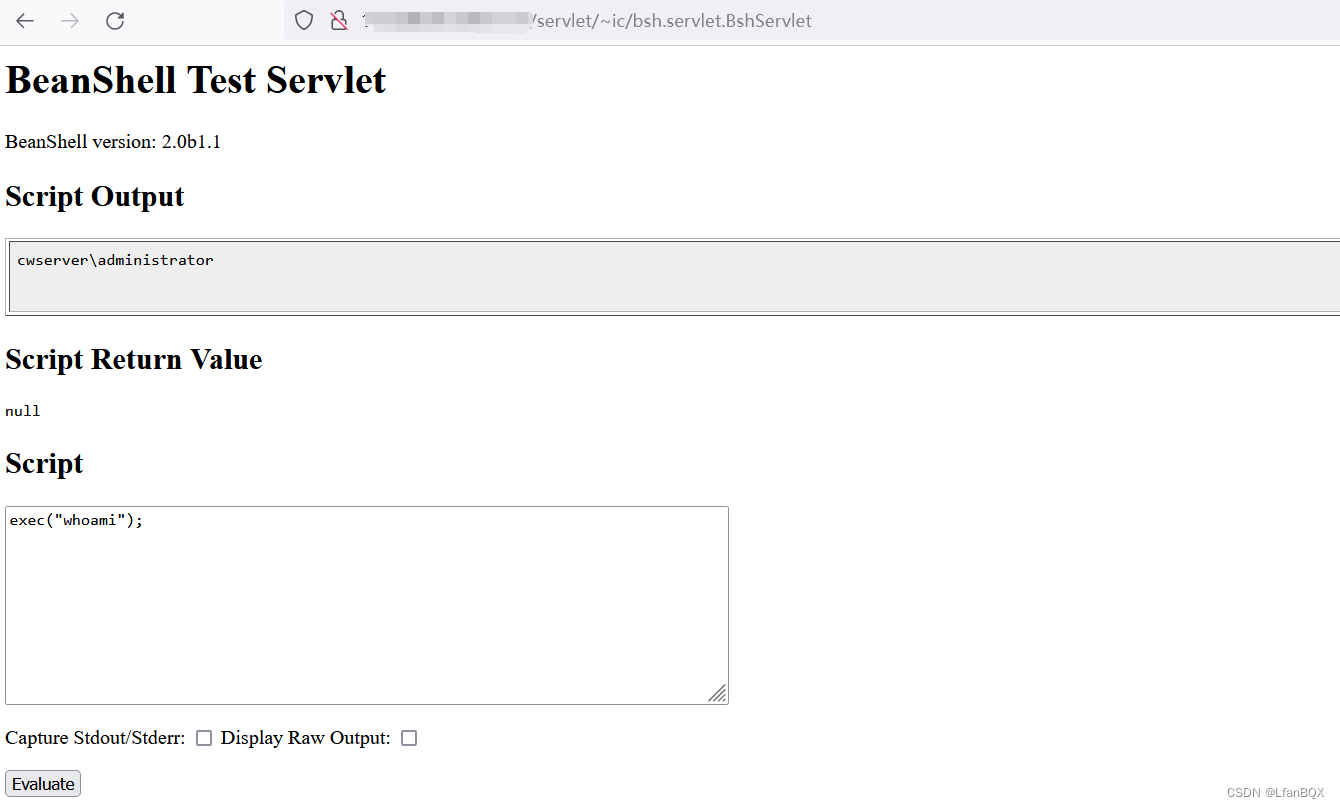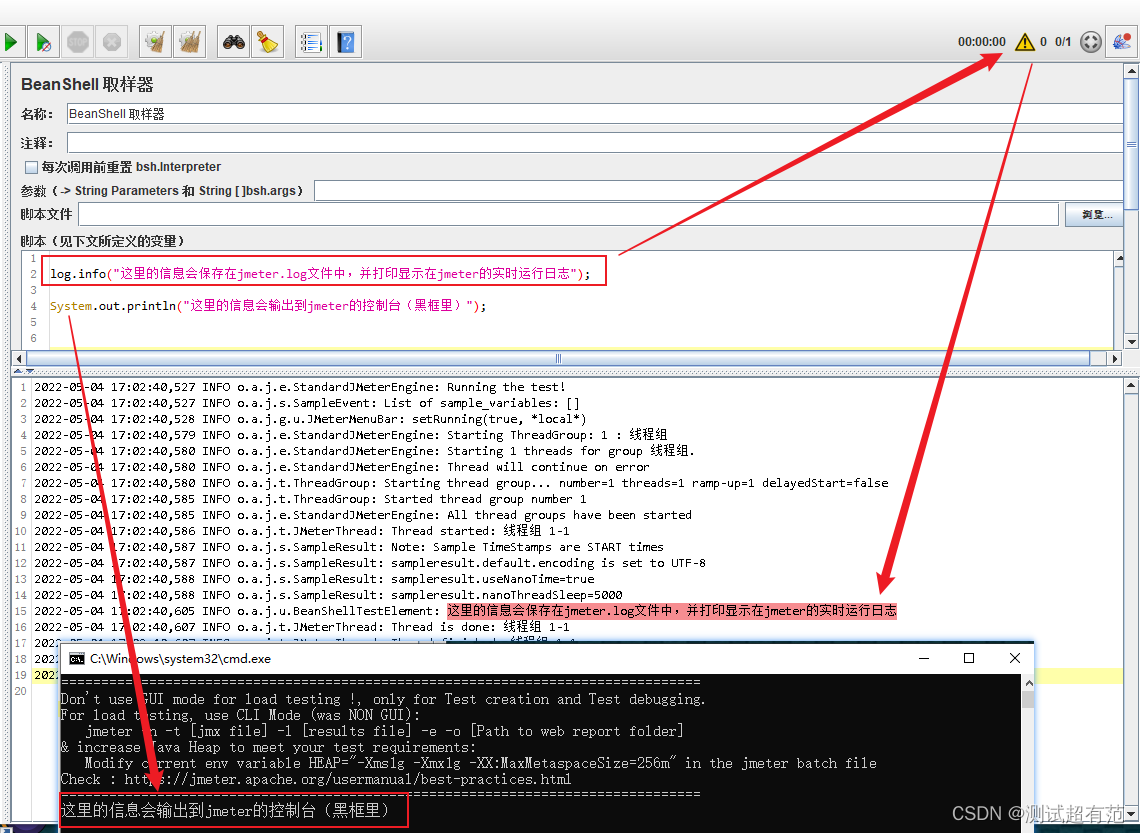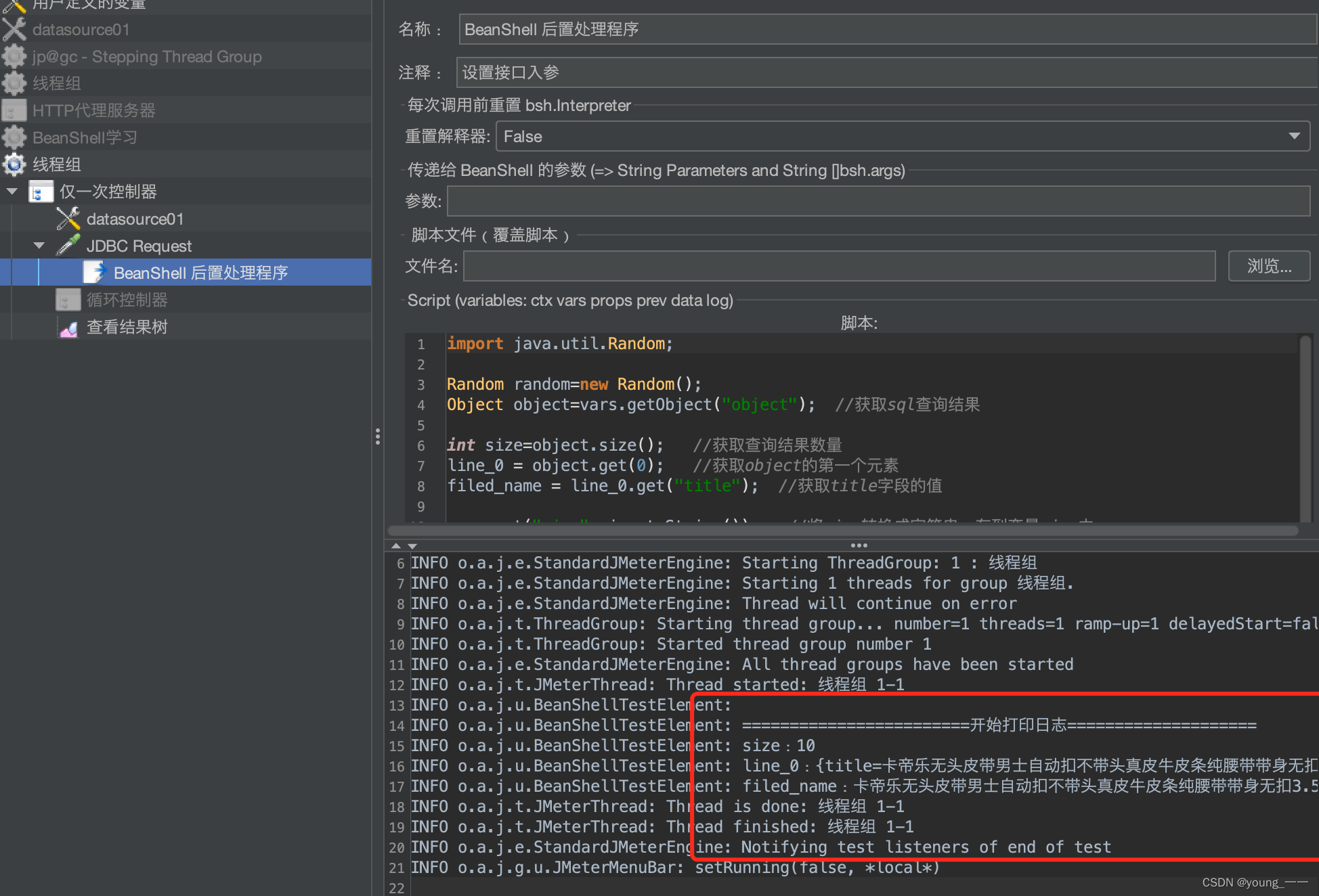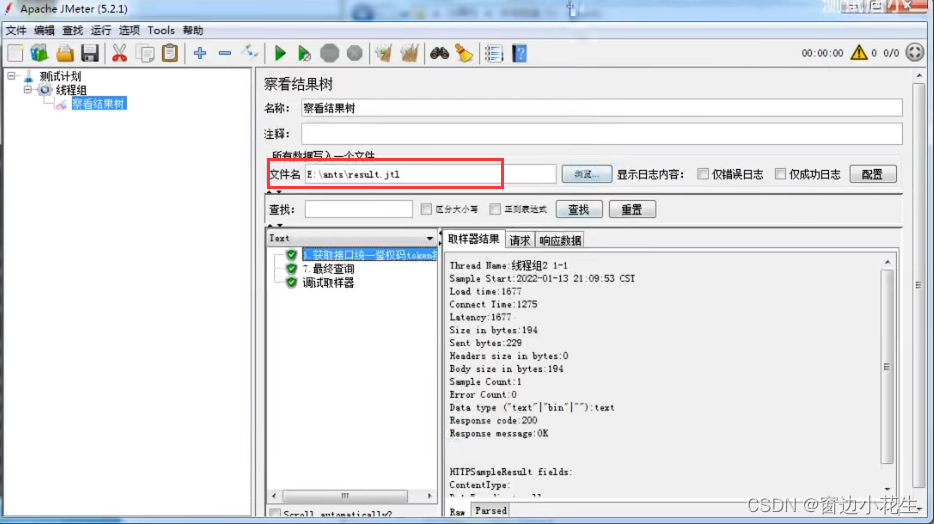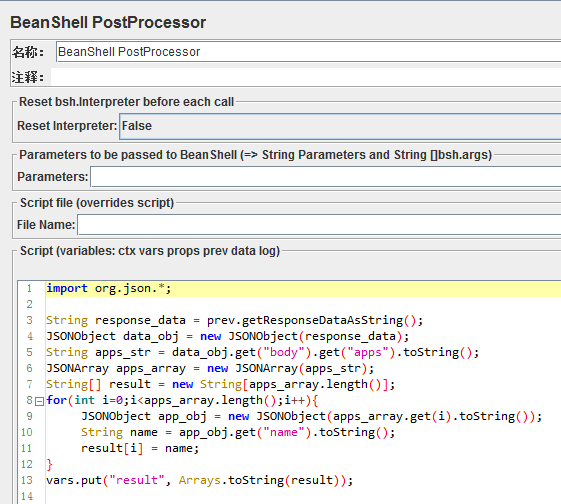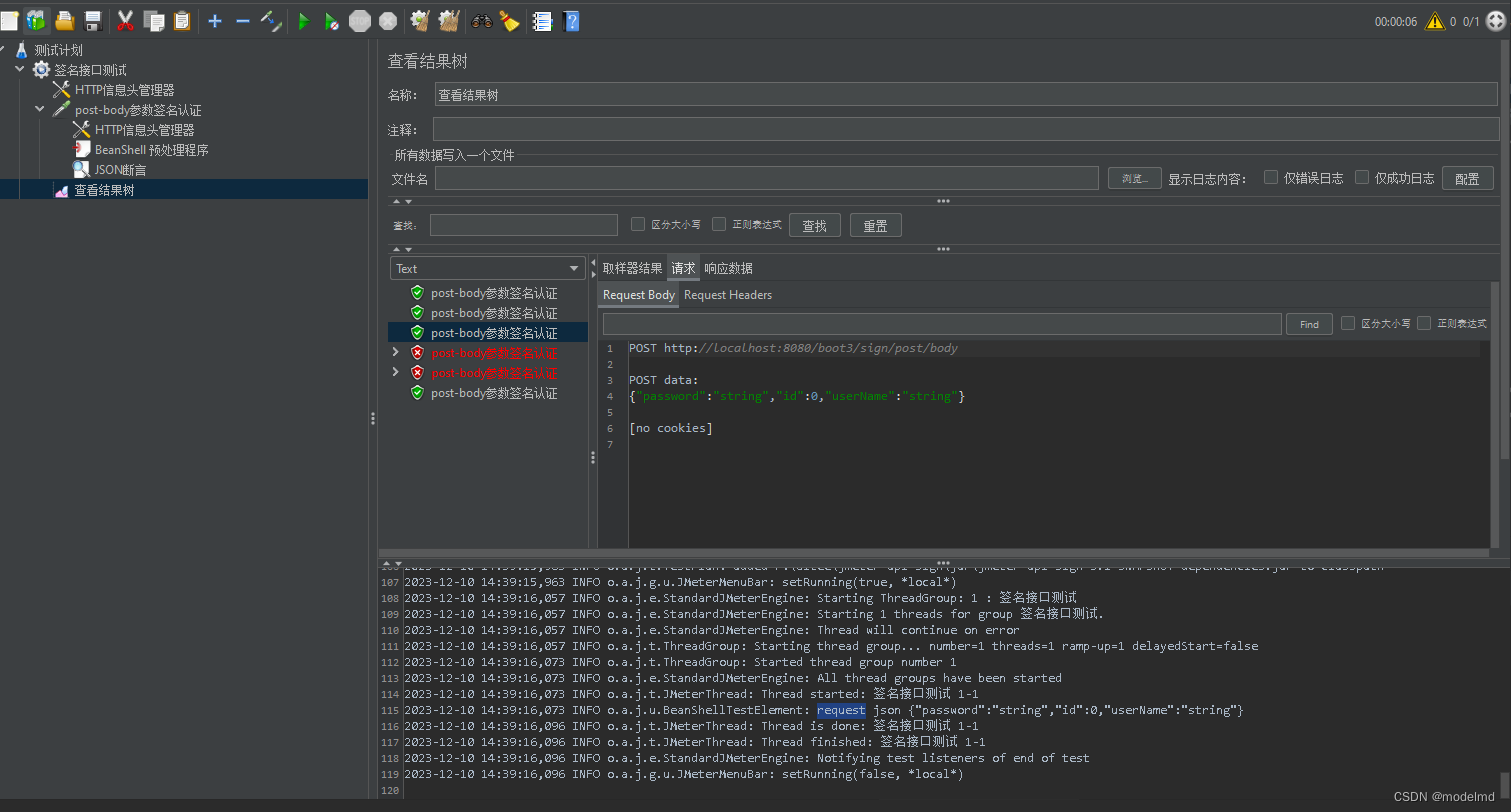beanshell专题
JMeter(二十一):使用BeanShell解析Json格式的报文
文章目录 一、本章介绍1.1、BeanShell前置处理器和后置处理器 二、Json对象1、使用beanshell 解析单层Json2、使用beanshell 解析多层Json3、关于json格式的数据使用及操作 三、使用JMeter变量四、注意事项五、总结 一、本章介绍 在JMeter的性能测试中,我们经常需要处理和分析各种格式的报文,其中JSON格式因为其轻量级和易读性
用友NC BeanShell远程命令执行(CNVD-2021-30167)漏洞复现
1.简介 用友NC是一款企业级管理软件,在大中型企业广泛使用。实现建模、开发、继承、运行、管理一体化的IT解决方案信息化平台。用友 NC bsh.servlet.BshServlet目录存在远程命令执行漏洞,可通过BeanShell 执行远程命令获取服务器权限。 貌似所有版本都存在。 2.FOFA上挑选一位存在CNVD-2021-30167漏洞的幸运儿,进行验证 3.网站访问/servl
JMeter之 Beanshell Java类定义
Beanshell类定义的问题 1、Beanshell中定义引用类型数据的问题 如:BeanShell中使用了ArrayList方法时,如果Java按照常规的写法: ArrayList <Company> companyList = new ArrayList<Company>(); 这样子在BeanShell是会报错: Response message: org.apache.jorp
JMeter之BeanShell的变量使用方法
前言 BeanShell简介 BeanShell元件所支持的变量、方法 Beanshell方法 log vars props ctx SamplerData Label / SampleLabel IsSuccess prev / SampleResult prev常用方法 SampleResult常用方法 ResponseData ResponseCode/Resp
Jmeter-BeanShell的使用介绍
最近学习使用了jmeter来对接口进行测试。使用jmter进行接口测试,有时候需要编写一些BeanShell脚本语言,或者利用BeanShell调用自己的工具类,来完成jmeter基本功能中无法实现的功能,下面将对BeanShell Sampler及其相关使用作一个简要的介绍。 一、什么是BeanShell BeanShell是一个小型嵌入式Java源代码解释器,具有对象脚本语言特性,能够动态
Jmeter Beanshell 设置全局变量
//获取token import com.alibaba.fastjson.JSONObject; import com.alibaba.fastjson.JSONArray; import java.util.*; import org.apache.jmeter.util.JMeterUtils; //获取可上机机器 String response = prev.getResponseDat
Jmeter之Beanshell详解
一、 Beanshell概念 Beanshell: BeanShell是一种完全符合Java语法规范的脚本语言,并且又拥有自己的一些语法和方法;BeanShell是一种松散类型的脚本语言(这点和JS类似);BeanShell是用Java写成的,一个小型的、免费的、可以下载的、嵌入式的Java源代码解释器,具有对象脚本语言特性,非常精简的解释器jar文件大小为175k。BeanShell执行标
Jmeter 后置处理器 BeanShell_PostProcessor 适用思考
首先摘抄一段官方文档的话: The following BeanShell variables are set up for use by the script: log - (Logger) - can be used to write to the log filectx - (JMeterContext) - gives access to the contextvars
Jmeter 前置处理器 BeanShell_PreProcessor 适用思考
首先摘抄一段官方文档的话: Before invoking the script, some variables are set up in the BeanShell interpreter: log - (Logger) - can be used to write to the log filectx - (JMeterContext) - gives access to th
Jmeter使用BeanShell保存数据到文件
1、目的 在使用jmeter压测时,业务上下连贯,需要对一些编号进行关联操作。这里使用‘JSON提取器’将值提取出来,后面请求可以直接使用。其它业务想要使用就只能把值保存到文件,再使用文件做参数化了。 2、JSON提取器 提取请求值 提取方式多种多样,正则、json、边界值等等。根据实际请求选择 在请求右键-添加-后置处理器-JSON提取器 Main sample and su
JMeter---BeanShell实现接口前置和后置操作
在JMeter中,可以使用BeanShell脚本来实现接口的前置和后置操作。 下面是使用BeanShell脚本实现接口前置和后置操作的步骤: 1、在测试计划中添加一个BeanShell前置处理器或后置处理器。 右键点击需要添加前置或后置操作的接口请求,选择"Add" -> “Pre Processors” 或 “Add” -> “Post Processors” -> “BeanShell
JMeter之BeanShell Sampler学习
笃信好学,自然宽和 JMeter在测试一个接口时,需要用到MD5加密后的数据,所用JMeter是3.0版本,在“函数助手对话框”中没有MD5函数;所以就用到Sampler中的“BeanShell Sampler”采样器;在BeanShell Sampler 的Script中可以直接编写java代码; 将MD5方法通过Eclipse打包成jar文件(Eclipse中设置方法保存的包是 com.j
6.jmeter非GUI命令及Beanshell组件
一、非GUI(界面)命令详解 1. -n 使用非gui方式,不能单独使用,必须和-t(指定jmeter的脚本)一起用。 #cmd命令行模式下,进入存放测试jmx文件的目录下 jmeter -n -t hello.jmx 只会生成一个log日志文件,没有任何报告输出 2. -l 生成jtl格式的报告 jmeter -n -t test.jmx -l result.jtl 注意:修改jm
Jmeter-BeanShell脚本中for循环里面使用random随机数函数,每次生成的都一样
预想的是每次循环生成的随机数不一样,但实际使用Random函数生成的是重复的。 以下是部分原代码: List updateList = new ArrayList();for(Object o: fieldList){Map map = new HashMap();map.put("id", o.get("id"));map.put("dataId", o.get("dataId"));map
Jmeter学习总结(6)——Beanshell中If和For应用
Beanshell中If应用: 如针对接口响应增加判断,在Beanshell PostProcessor中首先获取响应码,再通过If进行判断,比较相等的方式有以下两种equals或者==、!=,当404!=200时,会进入else语句 rescode = prev.getResonseCode();log.info("响应码为:"+rescode);if(!rscode.equals(20
【JMeter】使用BeanShell写入内容到文件
一、前言 在我们日常工作中,可能会遇到需要将请求返回的数据写入到文件中。在我们使用JMeter进行性能测试时,就经常能够遇到这种情况。要想达到这种目的,我们一般采取BeanShell后置处理器来将内容写入到文件。 二、提取 在目前大多数的性能测试中,都是以JSON形式返回结果。因此我们这边以JSON提取器为例进行提取。 先来介绍下JSON提取器吧 Main sam
Jmeter后置处理器之BeanShell
文章来源:https://www.cnblogs.com/sunny-sl/p/11231830.html 内置变量 log 写入信息到jmeber.log文件,使用方法:log.info(“This is log info!”); ctx 该变量引用了当前线程的上下文,使用方法可参考:org.apache.jmeter.threads.JMeterContext。 vars -
Jmeter定时器之BeanShell Timer
文章来源:https://blog.csdn.net/weixin_42197740/article/details/88955358 使用场景 用BeanShell脚本语言来访问及设置JMeter的属性,访问及设置变量,还可用来记录日志。如用BeanShell来设置线程延迟间隔。 相关参数 Reset Interpreter:每次迭代是否重置解析器,默认为false;在长时间
Jmeter BeanShell PostProcessor提取json数据
需求:提取sample返回json数据中所有name字段值,返回的json格式如下: {“body”:{“apps”:[{“name”:”111”},{“name”:”222”}]}} jmeter中添加后置处理器BeanShell PostProcessor import org.json.*;String response_data = prev.getResponseDataA
beanshell、jcef
BeanShell BeanShell是一个小型嵌入式Java源代码解释器,具有对象脚本语言特性,能够动态地执行标准JAVA语法。 BeanShell不仅仅可以通过运行其内部的脚本来处理Java应用程序,还可以在运行过程中动态执行你java应用程序执行java代码。因为BeanShell是用java写的,运行在同一个虚拟机的应用程序,因此可以自由地引用对象脚本并返回结果。 BeanShell
Jmeter 请求签名api接口-BeanShell
Jmeter 请求签名api接口-BeanShell 项目签名说明编译扩展jar包jmeter 使用 BeanShell 调用jar包中的签名方法 项目签名说明 有签名算法的api接口本地不好测试,使用BeanShell 扩展jar 包对参数进行签名,接口签名算法使用 sha512Hex 算法。签名的说明如下 请求参数类型 body 参数 原始字符串 originData a
Jmeter进阶使用:BeanShell实现接口前置和后置操作!
一、背景 我们使用Jmeter做压力测试或者接口测试时,除了最简单的直接对接口发起请求,很多时候需要对接口进行一些前置操作:比如提前生成测试数据,以及一些后置操作:比如提取接口响应内容中的某个字段的值。举个最常用的例子: 会员注册接口:需要使用电话号码作为入参,电话号码不能重复,注册接口需要添加前置操作生成不重复的电话号码。注册成功后:需要从接口返回的内容中,提取注册生成的用户ID的值,作
【Jmeter】JSON Extractor变量包含转义字符,使用Beanshell脚本来消除
如果使用Jmeter的JSON Extractor提取的变量包含特殊字符,直接引用时会包含转义字符。可以使用Beanshell脚本来进行字符串转换,从而消除这些转义字符。 import com.alibaba.fastjson.JSONObject;import com.alibaba.fastjson.JSONArray;import com.alibaba.fastjso
【JMeter】BeanShell了解基础知识
1. BeanShell是什么? 完全符合java语法的免费,可嵌入式的脚本语言 2.BeanShell用法 操作变量,使用vars内置对象 String 自定义变量名 = vars.get("变量名") 从jmeter中获取变量值并定义一个变量接收vars.put("key","变量名") 数据存储到jmet
05 取样器(BeanShell和JSR223 Sampler)
一、取样器作用 1、取样器可以理解为Jmeter的桥梁,或者是Jmeter的加工厂; 2、Jmeter使用过程中,经常有些数据不能直接使用,需要加工后才能使用;这样就用到了取样器;但是这里存在问题,Jmeter中的变量在取样器中不能直接使用,取样器中加工好的数据,Jmeter也不能直接获取到;怎么办?后面有详细介绍 二、常用取样器 1、常用的取样器主要是BeanShell取样器和JSR

